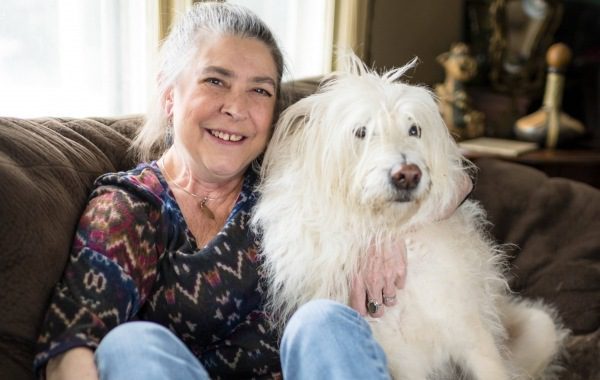While recovering from a hospital stay for a severe case of pneumonia three years ago, Brenda Day discovered she had a spot on her right lung. Doctors suspected it was scar tissue from the virus, but after a biopsy, Day learned she had inoperable lung cancer. It would eventually progress to a terminal stage.
Day asked her doctor how long she had to get her affairs in order. “He said nine months would be responsible,” she recalls. “That was two years ago.”
Day opted for a treatment called immunotherapy, where she would receive a drug that could harness her own immune system to battle the cancer. The Mt. Holly resident became one of a growing number of patients with advanced cancer who has found success with the treatment; for two-and-a-half years, she’s been receiving infusions every two weeks and otherwise leads an ordinary life.
“My response to it has been remarkable,” says Day, 59. “It’s halted the progression of the disease.”

Dr. James Lee, Regional Cancer Care Associates
“Immunotherapy has really revolutionized cancer care,” says James Lee, MD, an oncologist with Regional Cancer Care Associates (RCCA) in Mount Holly. “We are treating a lot of cancers that were previously untreatable. Oncologists are seeing people going into complete remission with these treatments, for years, and with minimal side effects.”
Such treatments have helped patients with a growing variety of cancers, and research continues to expand applications. However, doctors caution, immunotherapy currently shows the most success only when applied to specific end-stage cancers.
WHAT IMMUNOTHERAPY DOES
Because cancer cells are the body’s own cells that have mutated, the immune system usually doesn’t recognize them as invaders, and so it doesn’t attack them. Through a number of different ways, immunotherapy kickstarts the body’s own immune system so it can fight back against the cancer.

Dr. Robert Somer, MD Anderson Cancer Center
Immunotherapy works by empowering the cells in the immune system that fight off disease, called T-cells. “Some therapies release the brakes of the T-cells. Some step on the gas of the T-cells,” says Robert Somer, MD, head of the division of hematology and medical oncology at MD Anderson Cancer Center at Cooper. “When we combine these treatments, we are seeing pretty solid results with lung cancer, bladder cancer, kidney cancer and melanoma.”
Typically, immunotherapy is offered to patients with advanced cancer, often after chemotherapy. Although many patients respond positively, it isn’t right for everyone and doesn’t always work. But when it does work, the results are astounding. Some patients show no evidence of disease after starting immunotherapy, Somers says. “They get treated once every three to four weeks,” he notes. “They have a wonderful quality of life and are freed up from the oncology office, which is what we shoot for in cancer care.”
Immunotherapies are used to treat a growing variety of cancers, and research into more expansive use is underway. However, doctors emphasize that treatments, at this point, are mostly limited to specific, advanced-stage cancers.
“It’s not one size fits all,” says Seth Berk, MD, program director of the Penn Medicine Virtua Cancer Program. “The best therapeutic approach has to be tailored to specific characteristics of the individual’s tumor and the general health of the person.”
MAKING CELLS NOT INVISIBLE
One of the reasons the body can be overtaken by cancer is because cancer cells are pretty good at hiding within the body, so the immune system can’t locate them. But drugs known as immune checkpoint inhibitors change all that.
“Cancer cells have a cloak of invisibility, so the immune system doesn’t recognize them,” says Lee. “The drugs are uncloaking the cancer. The immune system is saying, ‘Oh, look. Cancer cell. Fight!’”
CHANGING GENES
Doctors have also found a way to genetically alter a patient’s own T-cells. This treatment – called CAR (chimeric antigen receptor) T-cell therapy – alters cells so they can fight the cancer.

Dr. Nandini Kulkarni, Inspira Medical Center
“This involves removing T-cells from the patient, genetically engineering them to recognize and target specific proteins on the cancer cells, and then administering them back to the patient to help fight the cancer,” says Nandini Kulkarni, MD, medical director of surgical oncology at Inspira Medical Center.
Some patients have had cancer eradicated through T-cell therapy, even if it didn’t respond to other treatments.
CANCER VACCINES
While there aren’t immunotherapy vaccines that directly prevent cancer, a limited number can be used to treat specific cancers, and some can prevent conditions that may cause cancer.
One such treatment relies on a virus to infect and kill tumor cells. While scientists are currently testing a number of viruses in clinical trials, only one has been approved by the FDA. The common virus, herpes simplex, is sometimes used to treat melanoma, if the cancer is advanced and cannot be surgically removed.
“They genetically modify the herpes simplex virus,” Somer says, “and then inject it into melanoma on the skin, and ultimately, it induces a response.”
Some may be concerned that the modified virus may also infect healthy cells, but doctors say the healthy cells have the ability to fight off viruses; cancer cells do not.
Another cancer vaccine has been approved to treat a certain type of advanced prostate cancer. To create the vaccine, doctors remove a substance from the patient’s blood, which is combined with a protein that helps to stimulate and reprogram the immune system. This personalized vaccine can help patients live longer.

Dr. Seth Berk, Penn Medicine Virtua Cancer Program
WHAT’S NEXT
As a growing number of cancers can now be treated with immunotherapy, researchers are examining its effectiveness on earlier-stage cancers.
“I hope that as further research continues, immunotherapy becomes a front-line option for the treatment of most cancers,” Kulkarni says. “Not just in the setting of widespread metastases, but as an adjunct to surgery, and even pre-operatively to downsize the tumors.”
For now, immunotherapy gives hope to patients who would otherwise have no options.
“It has allowed people to potentially get cures who were destined to die,” Berk says. “It’s allowed people to live longer without the side effects of standard chemotherapy.”
Day says: “It’s buying me time. Even if this does stop working, there are so many advances going on, that I have the opportunity to stay alive until the next thing comes along.”













